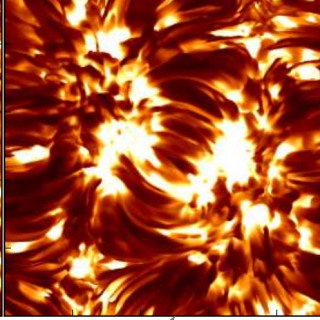Bibcode
Carlin, E. S.; Asensio-Ramos, A.; Trujillo-Bueno, J.
Bibliographical reference
The Astrophysical Journal, Volume 764, Issue 1, article id. 40, 12 pp. (2013).
Advertised on:
2
2013
Journal
Citations
31
Refereed citations
25
Description
Velocity gradients in a stellar atmospheric plasma have an effect on the
anisotropy of the radiation field that illuminates each point within the
medium, and this may in principle influence the scattering line
polarization that results from the induced atomic level polarization.
Here, we analyze the emergent linear polarization profiles of the Ca II
infrared triplet after solving the radiative transfer problem of
scattering polarization in time-dependent hydrodynamical models of the
solar chromosphere, taking into account the effect of the plasma
macroscopic velocity on the atomic level polarization. We discuss the
influence that the velocity and temperature shocks in the considered
chromospheric models have on the temporal evolution of the scattering
polarization signals of the Ca II infrared lines as well as on the
temporally averaged profiles. Our results indicate that the increase of
the linear polarization amplitudes caused by macroscopic velocity
gradients may be significant in realistic situations. We also study the
effect of the integration time, the microturbulent velocity, and the
photospheric dynamical conditions, and discuss the feasibility of
observing with large-aperture telescopes the temporal variation of the
scattering polarization profiles. Finally, we explore the possibility of
using a Hanle effect line-ratio technique in the IR triplet of Ca II to
facilitate magnetic field diagnostics in dynamic situations.
Related projects

Magnetism, Polarization and Radiative Transfer in Astrophysics
Magnetic fields pervade all astrophysical plasmas and govern most of the variability in the Universe at intermediate time scales. They are present in stars across the whole Hertzsprung-Russell diagram, in galaxies, and even perhaps in the intergalactic medium. Polarized light provides the most reliable source of information at our disposal for the
Ernest
Alsina Ballester